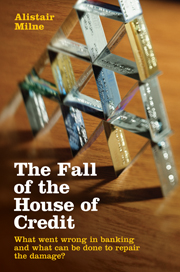 The Fall of the House of Credit
The Fall of the House of Credit Book contents
- Frontmatter
- Contents
- List of figures
- List of tables
- List of boxes
- Acknowledgements
- Introduction
- 1 Where did all the money go? An analysis of the causes and cure of the current global banking crisis
- 2 Build-up, meltdown and intervention
- 3 We have been here before, haven't we?
- 4 A basic funding tool – the tranched mortgage-backed security
- 5 Using tranching to make short-term transaction profits
- 6 Borrowing short and lending long: the illusion of liquidity in structured credit
- 7 The levees break
- 8 The flood of losses
- 9 Central banks and money markets
- 10 The run on the world's banks
- Conclusions: repairing the house of credit
- Glossary
- Index
Introduction
Published online by Cambridge University Press: 23 December 2009
- Frontmatter
- Contents
- List of figures
- List of tables
- List of boxes
- Acknowledgements
- Introduction
- 1 Where did all the money go? An analysis of the causes and cure of the current global banking crisis
- 2 Build-up, meltdown and intervention
- 3 We have been here before, haven't we?
- 4 A basic funding tool – the tranched mortgage-backed security
- 5 Using tranching to make short-term transaction profits
- 6 Borrowing short and lending long: the illusion of liquidity in structured credit
- 7 The levees break
- 8 The flood of losses
- 9 Central banks and money markets
- 10 The run on the world's banks
- Conclusions: repairing the house of credit
- Glossary
- Index
Summary
What this book is about
Why would anyone who does not work in the banking industry want to read a book about banking? The subject should be a bore. Savings accounts are not fashionable. Mortgages do not entertain. Most of us – well, apart from banking professionals and a few banking professors like myself – have better things to do than think about payment cards or credit transfers. All we want from banks is security and convenience: we want to trust them as the best place to keep our money and to be able to use our money without difficulty, so we can enjoy the things we desire – say a new car, a well-earned holiday, a restaurant meal, the latest DVD or the new jacket that has caught our eye. Some of us also want to be able to borrow reasonable amounts of money at not too great a cost and others – those with some cash to spare – are interested in the return that banks offer on savings. But even interest rates on bank borrowing and lending are only of passing interest, at those times when we have financial decisions to make.
Today, though, banking is attracting unusual attention. The reason is, of course, that banks are in deep trouble. Far from being boring, banks now arouse strong emotions: shock, confusion, anger and fear. Trust in banks has evaporated. Are they safe? How did they get into such difficulties? Who is responsible for their problems? How can we best prevent these spilling over into lost jobs and lower income and financial problems for all of us?
- Type
- Chapter
- Information
- The Fall of the House of CreditWhat Went Wrong in Banking and What Can Be Done to Repair the Damage?, pp. 1 - 23Publisher: Cambridge University PressPrint publication year: 2009


